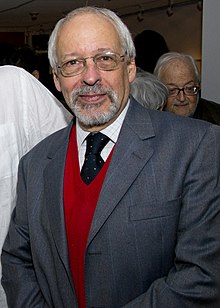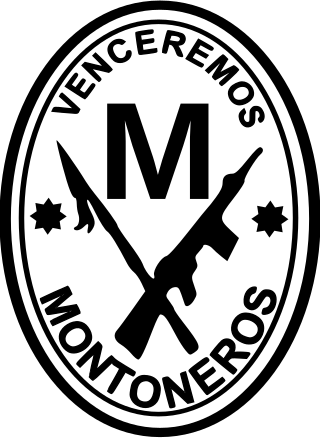
Montoneros was an Argentine far-left Peronist and Catholic revolutionary guerrilla organization, which emerged in the 1970s during the "Argentine Revolution" dictatorship. Its name was a reference to the 19th-century cavalry militias called Montoneras, which fought for the Federalist Party in the Argentine civil wars. Radicalized by the political repression of anti-Peronist regimes, the Cuban Revolution and socialist worker-priests committed to liberation theology, the Montoneros emerged from the 1960s Catholic revolutionary guerilla Comando Camilo Torres as a "national liberation movement", and became a convergence of revolutionary Peronism, Guevarism, and the revolutionary Catholicism of Juan García Elorrio shaped by Camilism. They fought for the return of Juan Perón to Argentina and the establishment of "Christian national socialism", based on 'indigenous' Argentinian and Catholic socialism, seen as the ultimate conclusion of Peronist doctrine.

Carlos Saúl Menem was an Argentine lawyer and politician who served as the president of Argentina from 1989 to 1999. Ideologically, he identified as a Peronist and supported economically liberal policies. He led Argentina as president during the 1990s and implemented a free market liberalization. He served as President of the Justicialist Party for thirteen years, and his political approach became known as Menemism.

Néstor Carlos Kirchner Ostoić was an Argentine lawyer and politician who served as the President of Argentina from 2003 to 2007. A member of the Justicialist Party, he previously served as Governor of Santa Cruz Province from 1991 to 2003, and mayor of Río Gallegos from 1987 to 1991. He later served as the first ever First Gentleman of Argentina during the first tenure of his wife, Cristina Fernández de Kirchner. By the time he died in October 2010, he was First Gentlemen from 2007, President of the Justicialist Party and National Deputy from 2009, and Secretary General of UNASUR from May 2010. Ideologically, he identified himself as a Peronist and a progressive, with his political approach called Kirchnerism.

Raúl Ricardo Alfonsín was an Argentine lawyer and statesman who served as President of Argentina from 10 December 1983 to 8 July 1989. He was the first democratically elected president after the 7-years National Reorganization Process. Ideologically, he identified as a radical and a social democrat, serving as the leader of the Radical Civic Union from 1983 to 1991, 1993 to 1995, 1999 to 2001, with his political approach being known as "Alfonsinism".

The Dirty War is the name used by the military junta or civic-military dictatorship of Argentina for the period of state terrorism in Argentina from 1974 to 1983 as a part of Operation Condor, during which military and security forces and death squads in the form of the Argentine Anticommunist Alliance hunted down any political dissidents and anyone believed to be associated with socialism, left-wing Peronism, or the Montoneros movement.
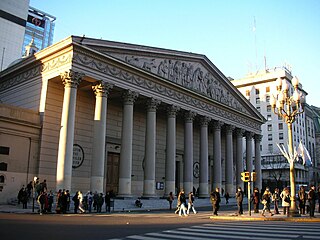
The Argentine Catholic Church, or Catholic Church in Argentina, is part of the worldwide Catholic Church, under the spiritual leadership of the pope, the Curia in Rome, and the Argentine Episcopal Conference.
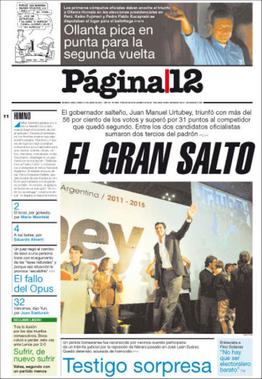
Página 12 is a newspaper published in Buenos Aires, Argentina. It was founded on 25 May 1987 by journalist Jorge Lanata and writers Osvaldo Soriano and Alberto Elizalde Leal.
The theory of the two demons is a rhetorical device used in Argentine political discourse to disqualify arguments that appear to morally equate violent political subversion with illegal repressive activities carried out by the state.
The first conflicts between the Roman Catholic Church and the Argentine government can be traced to the ideas of the May Revolution of 1810. The Tribunal of the Inquisition was suppressed in the territories of the United Provinces of the River Plate on 23 March 1813, and on 4 June the General Assembly declared the state "independent from any ecclesiastical authorities existing outside its territory".

Rodolfo Jorge Walsh was an Argentine writer and journalist of Irish descent, considered the founder of investigative journalism in Argentina. He is most famous for his Open Letter from a Writer to the Military Junta, which he published the day before his murder, protesting that Argentina's last civil-military dictatorship's economic policies were having an even greater and disastrous effect on ordinary Argentines than its widespread human rights abuses.

The Ezeiza massacre took place on June 20, 1973, at Puente 12, the intersection of General Ricchieri freeway and Camino de Cintura, some 10 km from Ezeiza International Airport in Buenos Aires, Argentina.

Antonio Quarracino was an Argentine prelate and cardinal of the Catholic Church in Argentina and the archbishop of Buenos Aires between 1990 and 1998.

Antonio Caggiano was an archbishop and a cardinal of the Roman Catholic Church in Argentina. He played a part in helping Nazi sympathisers and war criminals escape prosecution in Europe by easing their passage to South America.
The Night of the Pencils, was a series of kidnappings and forced disappearances, followed by the torture, rape, and murder of 10 high-school students that began on the evening of 16 September 1976 and continued into the next day, during Argentina's last civil-military dictatorship. The event is one of the most infamous acts of repression committed by the last Argentine military dictatorship, as most of the victims were under 18 years of age. Four of the victims survived; the remains of the others have never been found.
Esther Norma Arrostito was an Argentine political far-left militant, initially close to communist ideology. In 1970, she became one of the founders of the Peronist revolutionary movement Montoneros along with Fernando Abal Medina, who developed a romantic relationship with her. She played a key role in the kidnapping and killing of General Pedro Eugenio Aramburu.
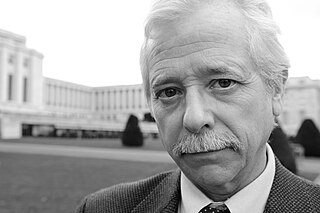
Juan Gasparini is an Argentinian investigative journalist and author.

Juan Manuel de Rosas was Governor of Buenos Aires Province during the Argentine Civil Wars. Deposed during the battle of Caseros, he spent his later life in exile in Southampton, England, where he died on March 14, 1877. He was buried at the Southampton Old Cemetery, and after a number of failed attempts the body was repatriated to Argentina and taken to La Recoleta Cemetery, where his remains are buried.
Viviana Gorbato was an Argentine journalist, writer, and university professor.
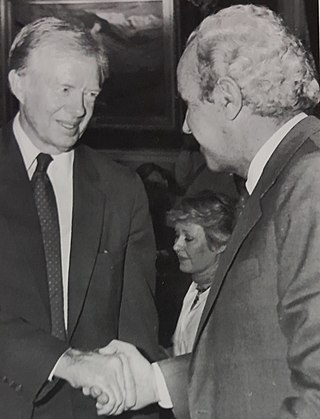
Augusto Conte Mac Donell was an Argentine lawyer, human rights activist and politician. He was a leader of the Christian Democratic Party, and co-founded and led the Center for Legal and Social Studies (CELS). He was a defender of human rights.

Miguel Luis Bonasso is a former Argentinian guerrilla leader, writer and politician. He was part of Montoneros during the '70s. After the returning of democracy in Argentina, he was elected national deputy and started a career as a journalist and writer of topics related to the National Reorganization Process and politics.
